2024 Range Rover Velar First Drive Review: Off-roading in Champagne
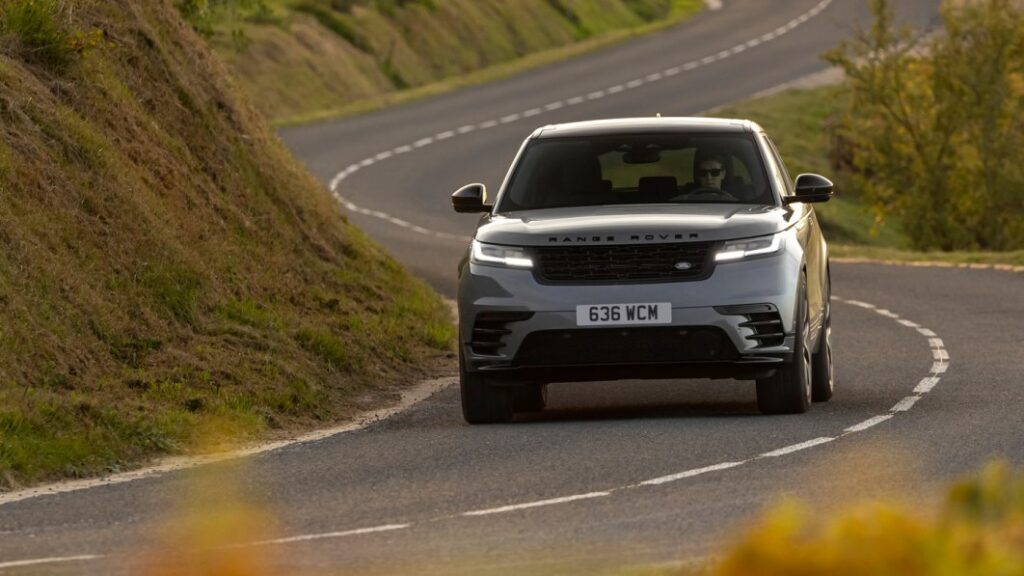
CHAMPILLON, France – I’ve off-roaded in a fair share of places. There was Moab, Utah, and Mexico’s Baja Peninsula. The mighty Rubicon Trail in California, and that state’s Imperial Sand Dunes, so vast and surreal you’d swear you weren’t in the United States at all. Michigan, where I grew up and owned a few Jeep Wranglers to grind through endless winters. The gnarly Class 4 roads of Vermont (underrated), and a sprinkling of exotic locales: Iceland, Greece and the Sahara in Morocco.
But until this minute, in a 2024 Range Rover Velar, I’ve never negotiated a steep, muddy champagne vineyard in France, taking care not to crush orderly columns of pinot noir and chardonnay grapes. Not before their time, of course.
Come to think of it, with ground-zero of the world’s best bubbly visible in the hazy valley below — Epernay, the capital city of the Champagne region — this vineyard in Champillon is ideal terroir to cultivate renewed appreciation of the Velar. It’s a stretch to imagine Range Rover’s city-oriented smoothie clambering over obstacles in Utah, even if the Velar can handle far-tougher terrain than people might realize. But I can absolutely see a winery owner, whether a wealthy entrepreneur indulging a late-career wine fantasy in Napa or Tuscany, or the fourth-generation caretaker of a French chateau, touring the Back 40 of his or her estate in a dusty Velar. And then setting the nav to a fabulous three-hour dinner in town. If this is sounding like a personal fantasy, well, maybe it’s the wine. (After the drive, naturally).
The Velar stormed out of the green Midland hills of Solihull, England, for 2018, and made a solid first impression. Along with its Jaguar F-Pace platform mate, they made as pretty a pair of SUVs as the world had seen. The Velar won the World Design of the Year award in 2018. It then posted just over 17,000 sales in both 2018 and 2019, a strong showing for a new luxury nameplate sandwiched between the smaller Evoque and larger, more-established Range Rover Sport. The Velar outsold the F-Pace in both years, with Jaguar’s most-popular model (by far) finding about 13,000 and 15,000 buyers respectively.
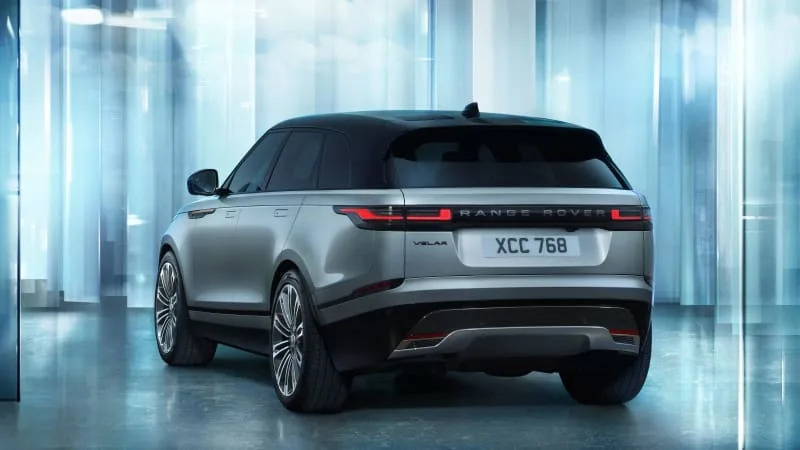
Debonaire looks aside, both these Brits offered outstanding packaging, with more cargo space that you’d ever expect, considering their taut shapes and low-roofed bodies. The Velar’s vast 34.4 cubic-feet of stowage behind the second row is more in line with non-luxury, family-hauling compact SUVs like the Honda CR-V and Toyota RAV4 than luxury compacts. We’d have to see how it shakes out in our real-world testing, but theoretically, it’s best-in-segment by a wide degree. Cargo space is even bigger than some midsize models, should you be comparing it more to a BMW X5 than X3 (the price tag may warrant that, too, more on that later).
For 2024, Velar gets a styling refresh, but the overall design stays true to the original’s “reductive design” language that went on to be adopted by the latest flagship Range Rover and Range Rover Sport. The updates include the latest family grille and reshaped LED headlamps with streamlined running lights. At the rear, designers accentuated the Velar’s elegant overhang with a new lower bumper and LED taillamps with a 3D effect and brighter “super red” illumination. The Land Rover badge is gone, too, as Range Rover has graduated to become one of four occupants within parent JLR’s “House of Brands.” More than ever, from its floating roof to its imposing stance, the Velar simply looks like the Range Rover Jr. And that’s never a bad thing.
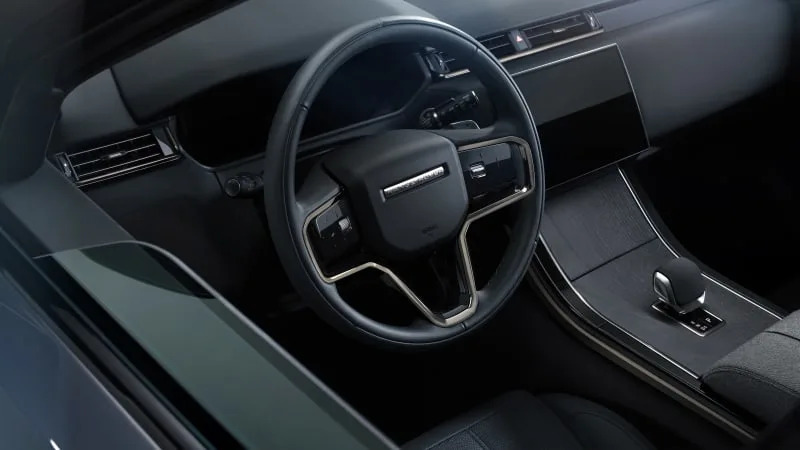
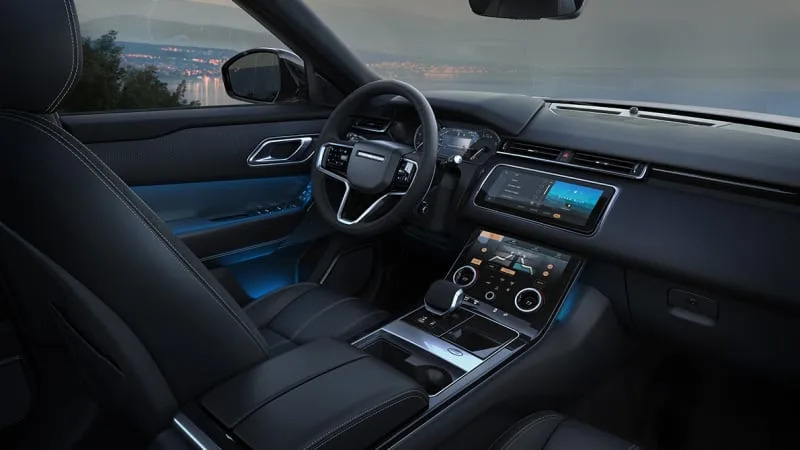
2024 design (top/left) with original
That’s about it on the outside. But the inside keeps the Velar near front-of-pack in authentic, tactile luxury — even if there are precious few knobs or switches to twiddle. As with its junior partner, the Evoque, the Velar gains a single, 11.4-inch curved touchscreen that now handles all infotainment and climate functions. Running JLR’s latest Pivi Pro system, its greatly improved despite an increased workload, and integrates wireless everything: Apple CarPlay, Android Auto and OTA updates, along with Alexa.
The former lower screen, complete with its physical temperature knobs, has been replaced by a covered center console bin with wireless charging. There’s a start-up screen for quick access to features such as heated seats. Once in motion, that gives way to a three-panel home screen that intuitively manages most every function. Rover says roughly 80% of screen functions require two taps or fewer. A pair of “sidebar” displays house virtual sliders for climate temperature, audio volume, navigation and cameras. Adjusting volume or temperature on-the-fly can be tricky, but of course there’s an audio toggle on the steering wheel, along with voice controls.
The lower screen also used to manage the Terrain Response 2 system for off-road excursions, meaning the main screen is now tasked with selecting one of the seven settings for varied environments. Hill Descent Control and All-Terrain Progress Control are onboard, for drivers who prefer to let the machines take over on steep or slippery terrain.
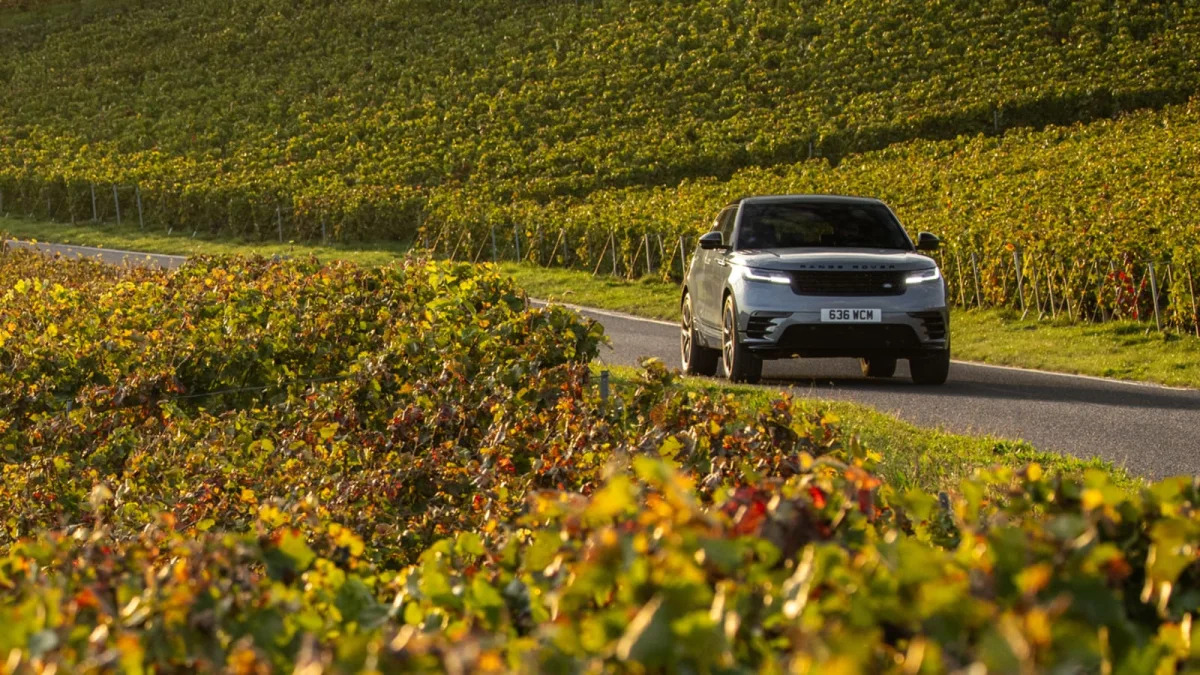
On an opening drive to Champagne in equally tricky conditions — the snarled traffic of Paris — the Velar flaunted what Range Rover claims is the quietest cabin in its class. Active noise cancellation joins with a range of Meridian audio systems, including a sparkling, range-topping unit with 17 speakers and 750 watts.
Since its debut, the Velar has seen everything from inline-sixes to an obscure four-cylinder PHEV and a 5.0-liter V8 SVAutobiography Dynamic edition. We were initially excited to drive a markedly upgraded PHEV model, with a roughly 40-mile electric-only range and larger 19.2 kWh battery. But JLR executives informed us that the Velar PHEV will not be coming to America.
For 2024, the Velar soldiers on with its current powertrains. A 2.0-liter turbo-four brings 247 horsepower, 269 pound-feet of torque and a modest 7.1 second run from 0-60 mph. Those versions, dubbed P250, start from $62,775, including a $1,275 destination charge. That’s a $1,200 jump from the 2023 model, and closer to the starting point of a BMW X5, for instance, than an X3.
We went bigger with a Velar P400 Dynamic SE, starting from $71,875 – a cool $10,000 more than an X3 M40i. A sprinkling of options lifted that further to $83,125 and a top-shelf P400 Dynamic HSE starts from $86,070 in near-loaded guise.
P400 versions get a powertrain more in keeping with the Velar’s position, a mild-hybrid, 3.0-liter turbo inline-six with a robust 395 horsepower and 405 pound-feet. While this mellow-throated, overachieving six escorts the brawny Defender 110 to 60 mph in 5.8 seconds, the lighter, lower Velar P400 requires just 5.1 seconds to turn that trick, abetted by a smooth eight-speed, paddle-shifted automatic. Those P400s get a standard, comprehensive Adaptive Dynamics system with a magnetic suspension and height-adjustable air springs. The system boosts the Velar’s body and wheel control, and does an impeccable job smothering bumps and keeping noise from intruding in the cabin.
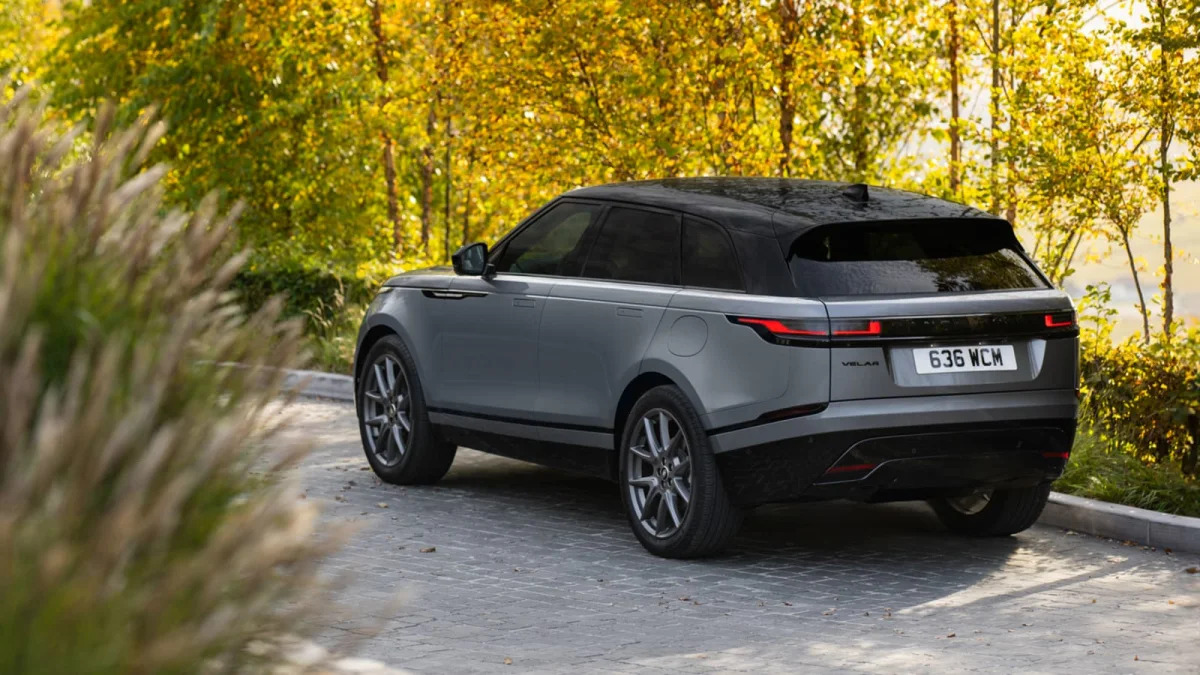
It all makes the Velar an indulgent SUV, one whose practical side tends to get overlooked. For one, while its surprising off-road chops tend to get eyes rolling, there’s something to be said for a luxury SUV that can actually do SUV things — including in water, snow, muck and mire — in a way that would leave, say, a Porsche Macan sidelined or stuck.
The Velar will definitely raise your fashion game. What it won’t do is raise your pulse in the manner of a Macan or the Velar’s F-Pace cousin. This Range Rover feels capable at all times, and seriously quick in P400 guise, but its cashmere-soft suspension tuning means it never feels particularly sporty or eager.
That’s perfectly OK for this application. Prior to our excursion, our Velars lined up the Royal Monceau, a landmark Parisian hotel recently renovated by French designer and architect Philippe Starck. Coincidentally, the King of Chad was about to depart, and his national-flagged Mercedes C-Class awaited him, along with an earpiece-wearing security team and a police escort.
To anyone passing by, our row of gleaming Velars looked for all the world like part of this imposing diplomatic convoy. Again, Range Rover Jr., not your mom’s Audi Q5 or X3. If that’s an image you’d consider presenting, perhaps consider a Velar.



